Last updated: August 23, 2022
Article
Conservation Diaries: Kia Hill, Storyteller of Black History and Administrator
-
Conservation Diaries: Kia Hill, Storyteller of Black History and Administrator
Listen to this episode of Conservation Diaries as Kia Hill shares her National Park Service journey, from an intern to a full-time employee.
- Credit / Author:
- NPS
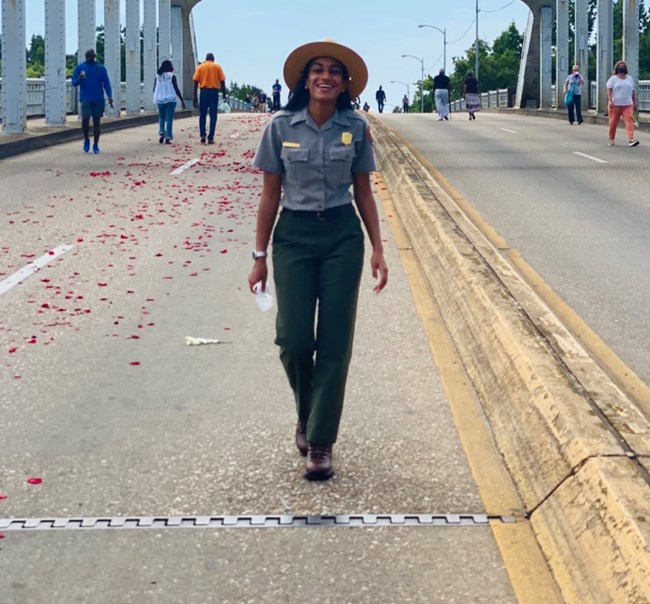
NPS Photo
Meet Kia Hill, the secretary for the superintendent of Birmingham Civil Rights National Monument and the Freedom Riders National Monument in Alabama.
Kia is from the small town of Greensboro, Alabama. She majored in Business Administration with a concentration in Management at Concordia College Alabama. While she enjoyed her time spent in college because she met a lot of different people and got to make friends that would last a lifetime, at one point when she was a junior, she considered changing her college career path, until an interesting opportunity came along.
“My advisor got word of it, and he was like, ‘Oh gosh, no, no, no, no. I'm going to get you an internship.’ And I was like, ‘okay, cool.’ And that’s how I found out about an internship with the National Park Service.”
Kia’s advisor helped her find an internship with the Greening Youth Foundation, which works collaboratively with the National Park Service to provide interesting and challenging career pathways to young people from diverse backgrounds. The Foundation’s interns serve in every capacity of resource management across the different National Park Service sites, from cultural resources and interpretation to biological sciences, engineering, business, and more.
Kia became a cultural resources intern for the Selma to Montgomery National Historic Trail Interpretive Center. Before her internship, Kia didn’t know much about the National Park Service, or about the different places it manages, including Selma to Montgomery National Historic Trail. But since day one, she was all in and for her it was a mind-blowing experience.
“I fell in love with telling the story about the voting rights movement. I fell in love with talking to different people and from all over the world. The story itself is so rich and fulfilling and I really enjoyed it.”
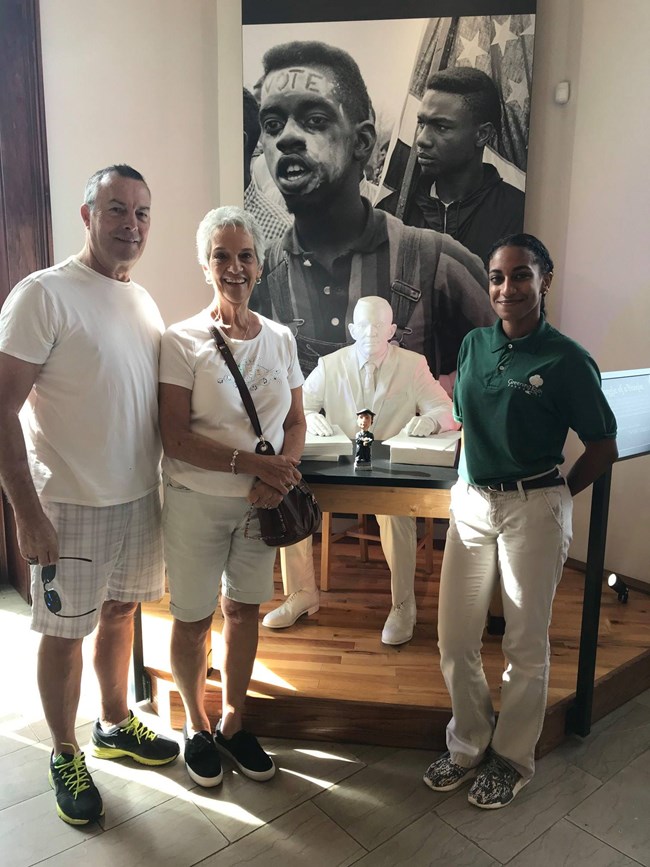
NPS Photo
Established by Congress in 1996, the Selma to Montgomery National Historic Trail commemorates the people, events, and route of the 1965 Voting Rights March in Alabama. About 25,000 marchers concluded the historic march in Montgomery on March 25th, with many notable speakers addressing the crowd at a concluding rally near the state’s capitol building. Dr. Martin Luther King, Jr. gave one of his most famous speeches at the rally. The Voting Rights Act was signed on August 6th, 1965. Visitors can learn about this history and trace the events of these marches along the 54-mile trail.
The historic march route is part of the National Trail System and is administered by the National Park Service. The route was also designated as a National Scenic Byway/All-American Road by the U.S. Department of Transportation.
The most rewarding part about Kia’s job was being able to make deep and meaningful connections with visitors, while interpreting the historic trail’s themes.
"In 2017 I met someone who was crying as I was telling her the story. I consoled her and gave her a tissue...and we've been close friends ever since. That's what it's about. It's about making that connection with people when you're telling such a powerful story. That was the most rewarding thing.”
Kia spent her last years of college both studying and working (the internship was paid). Her internship was extended until she graduated. After Kia completed her internship, she was able to get her Public Land Corps hours, a noncompetitive hiring authority can help when applying to federal jobs. And in 2018, on her birthday, Kia received a call offering her a job as a full-time park guide right there at Selma to Montgomery National Historic Trail.
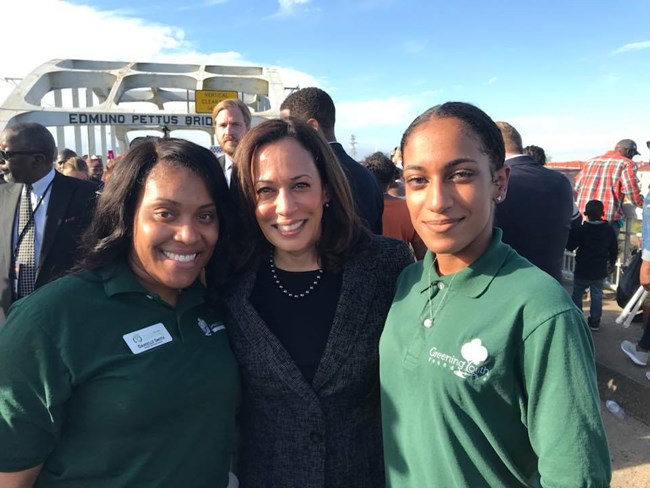
NPS Photo
During her time at the historic trail, as both an intern and a park guide, Kia saw the importance of telling these stories, of Black history, of crucial moments in America’s history, and having a Black woman doing it.
“There's only a pinch of Black history that is told. And this empowered me to go harder and to continue to be a truthful storyteller to people. It put a fire under me. When I was in school, I learned about only two prominent Black figures, and that was Martin Luther King and Rosa Parks. But there’s so much more to talk about the amazing history of Black people, as well as the unfortunate, sad events that took place.”
Kia’s main goal as a storyteller and interpreter of history is to continue to make sure everyone learns about Black history, both the good and the bad, the great people and the sad events. Because it is all part of our shared American history. And instead of shying away from hard truths, Kia believes it’s vital to teach young kids, from all backgrounds, about these moments in history, so they learn empathy and cooperation. Things cannot change for the better without these conversations.
“These are events that happened. These events are real, and these events happened not too long ago. We can’t forget because it is all part of our history and it's vital to us. If you don't tell these stories, you will forget and repeat. This is so important to me.”

NPS Photo
Kia is also passionate about being a role model for young Black kids and making sure the National Park Service is continuing to work to become more inclusive and diverse. She remembers a Jubilee event in Selma that she was part of. She says an African American family approached her and told her they had never seen a Black park ranger before and that their daughter wanted to take a picture with her. She did and it got her thinking about things she could do to increase diversity, equity, and inclusion at the National Park Service. That’s when she began attending career and internship fairs for the National Park Service, talking directly to the community, and attending friend group meetings.
“It brings so much joy to my heart when I see beautiful Black kids, people of color, look at me and smile and say, ‘How can I become a park ranger?’ You can be whatever you want to be. And I think it's important for young Black kids to see me in this uniform, because I was that kid. It’s my job to do whatever I can to get them in here. It's my job to leave these doors open for them to walk through, because somebody left the door open for me.
It is also our job to connect with these communities. We want to see more people of color at national parks and working at the National Park Service. So, what can I do? What can we do to increase this?”
After working at the national historical trail for a few years, Kia became the secretary for the superintendent of Birmingham Civil Rights National Monument in Birmingham, Alabama, and the Freedom Riders National Monument in nearby Anniston, Alabama.
Both national monuments tell crucial aspects of Black history. The Freedom Riders National Monument includes the former Greyhound Bus Station where segregationists attacked a bus carrying Freedom Riders in May of 1961, and the spot six miles away on the side of the highway where they firebombed the hobbled bus and attempted to trap the Freedom Riders inside it. The Birmingham Civil Rights National Monument was established in 2017, and encompasses roughly four city blocks in downtown Birmingham, Alabama, where a lot of young Black youth participated in Civil Rights protesting.
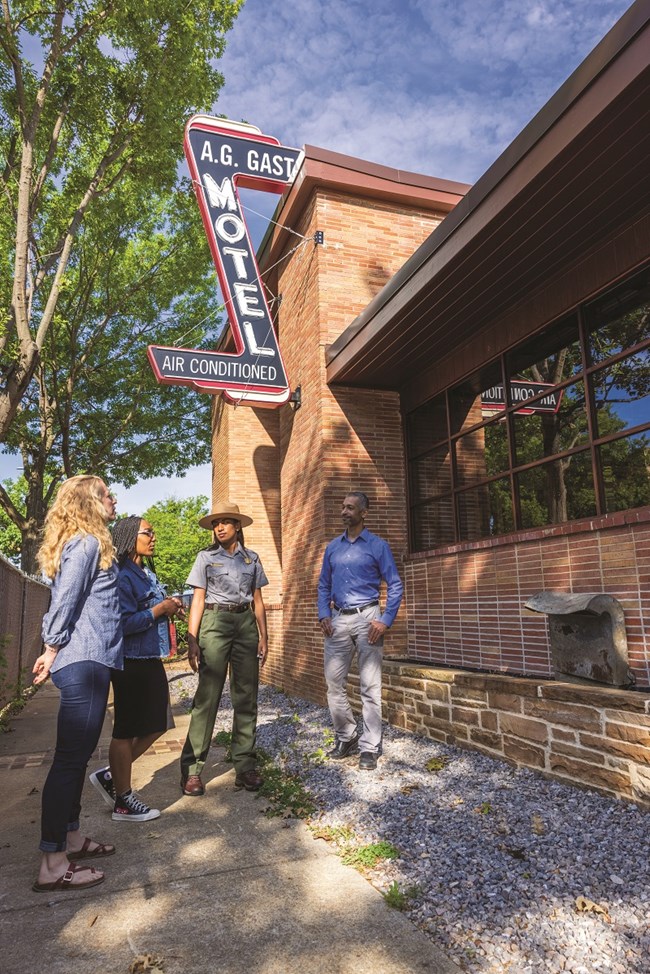
Photo courtesy of Chris Granger, Alabama Tourism Department
“A lot of prominent figures such as Reverend Fred Shuttlesworth and Dr. King held meetings at the A.G. Gaston Motel. That's our site. There’s a lot of rich history here in Birmingham, Alabama. Like I said before, some of this history is not in history books for kids to learn about. However, it is our job to tell these stories in a meaningful and genuine way and to make sure everyone learns about it.”
When Kia first got to her new sites it was a little difficult, because she had been doing interpretation for so long, but she was able to quickly figure things out, with the help of her coworkers. As an administrator she handles record management, which includes ensuring that the essential records are organized and maintained so that they are easily retrieved and identifiable as to the program they pertain. She also designates a record copy of each document, product, or other record and keep it in an official file, as well as handling property management and fleet. Administration supports everything. It provides resources, funding, logistics, and the behind-the-scenes work that allows conservation to happen.
Kia is excited to continue to tell these important stories of Black and American History and continue to be a role model for Black youth. And she also wants young people, especially from underrepresented communities, to have faith in their skills and know that their voices matter and are needed at the National Park Service.
“I want young people to know, especially young people of color, that they can and should apply to those jobs. A mentor once told me ‘never feel like you don't possess the knowledge or capability skills for this job. Always apply.’ Apply. If you're interested, apply. You never know what may happen.”
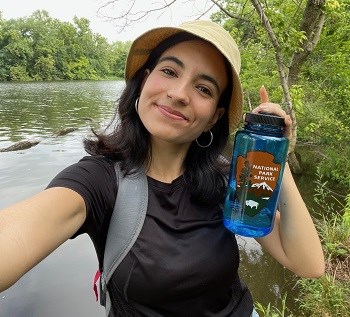
NPS Photo
Meet the Host
Nicole Segnini created the Conservation Diaries podcast series in 2021 during her Latino Heritage Internship Program internship with the National Park Service's Office of Communications in 2021. Venezuelan-born, she knows firsthand Latinx communities' passion and commitment to conservation and wanted to engage the rising generation of stewards—of all cultural backgrounds—to picture themselves in conservation careers or working in the National Park Service. Nicole used her background and experience in journalism, social media influencer, and television news producer to create the Conservation Diaries podcast series to bring out the stories of youth in the National Park Service from their own perspectives.
"There are so many young people in underrepresented and minority communities across the country who care so much about conservation, historical preservation, nature, wildlife, the outdoors, and our beautiful parks, and I think it's important that we elevate and amplify their voices and their important work. They are working hard to protect and preserve our natural, cultural, historical, and recreational resources and I believe that work is usually overlooked. That's why I wanted to start something like this." - Nicole Segnini
